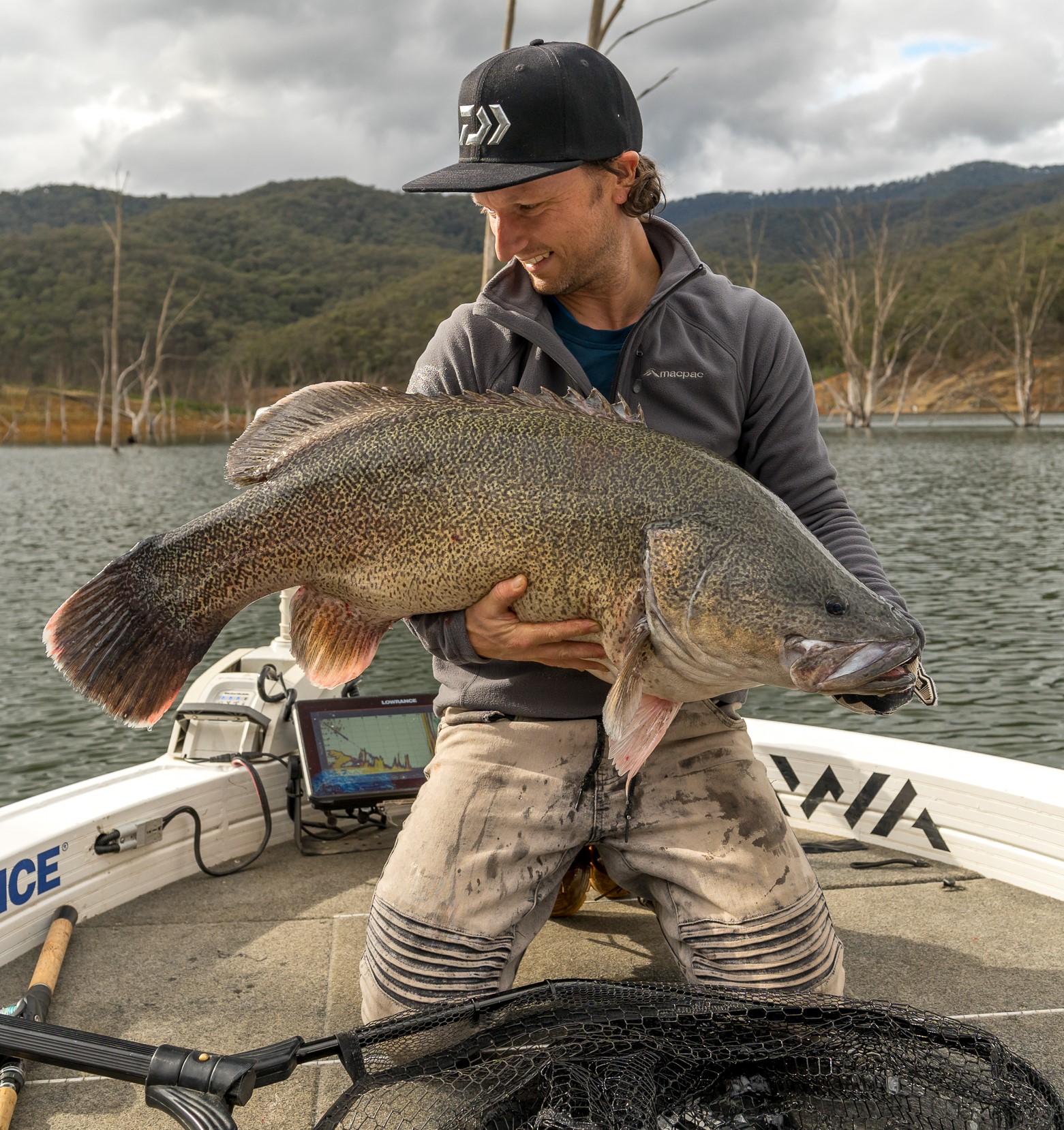How to catch Murray cod
Lake Murray cod are beautiful fish! The lake’s clean water brings out their best colors and striking patterns. They also put on great condition and reach impressive sizes, usually quite quickly. Boat fishers troll or cast lures while bait fishers tend to try a spot for an hour or two before moving to another. Shoreline fishing can be deceptively effective as cod will commonly move to shallow areas to hunt, especially in low light. You’re always in with a chance. Persistence is the key to all cod fishing as they can be moody, refusing anything for hours and then suddenly switching on.
 Trolling
Trolling
Trolling is probably the most reliable way to encounter big lake cod! Using large deep diving lures, swimbaits and even surface lures, trollers normally pull two lures out behind their boat, often in deep water in four to 10 metres. The deep diving lures will vibrate and clunk into the bottom and across submerged timber. Percentage wise, that’s a great way to find a hungry cod.
On the downside, trollers must be prepared to retrieve lures when snagged and lose a few through the course of a day. It’s an art know how to navigate the shoreline to stay in the strike zone, but not be constantly snagged up. Fishing this way works best as a two-person operation. Rubbing through the trees, trollers are best served with heavy baitcaster or spin outfits around 6 foot in length with 50lb braid and a 60lb monofilament or fluorocarbon leader of about 5 feet.
Lure casters
Arguably the most serious Eildon cod fishers are boat-based lure casters. They put in significant hours and hundreds of casts at likely structure such as standing and fallen timber, weed edges and banks hoping to intersect a Murray cod. Generally, lure casters concentrate in waters less than six metres and focus between that depth and the bank edge. Large spinnerbaits, bibbed lures, swimbaits and surface lures are effective depending on the time of day. Water clarity can play a big part also. In clear waters fishers lean towards realistic fish like lures such as swimbaits. Longer rods are used to get bigger casts with 7 to 8-foot-long models ideal. Use a baitcaster reel and 50lb braided line with 5ft of 40 to 60lb leader.
Bait
Boat fishers usually tie up to a snag or standing timber, lower baits then play a sit and wait game. Traditional baits such as bardi grubs, yabbies, shrimp or scrub worm are being challenged by non-natural baits like raw chicken pieces and cheese! As odd as it sounds it does work. The running sinker rig is ever popular, and a circle hook will prevent gut hooking, enabling any fish to be released in good health. The same gear for trolling is great for bait fishers. Move every hour or so to try and intersect with active fish.
Shore-based fishers
Shore-based lure casters hurl presentations out as far as they can through gaps in the trees and work lures back slowly to their feet. What you never know is when the next cast is the one. When lures are worked back to the bank, a cod strike can happen in the last few metres, which sure gets the heart racing! Lure types are the same as boat fishers, but the nature of cod fishing around structure will see heavy losses. This can be minimised by using smaller spinnerbaits that can be bounced over structure or bibbed diving lures that float up and over snags when paused. Surface lures are another way to go as they’ll go over the top of anything subsurface. A big cod caught from the shore on a lure is a significant trophy!
Bank fishing with bait is a relaxing way to target cod in lakes. Use the same baits of bardi grub, yabbies, shrimp, chicken or cheese. Set up adjacent to snags and cast out into a few metres of water. Cod regularly patrol these edges when active and you stand an excellent chance. Make sure you anchor any rod as a decent cod will quickly rip it into the water. Go for a 7-foot medium heavy spin rod with 50lb braid, 5 foot of 60lb leader and circle hooks to match the size of the bait.
